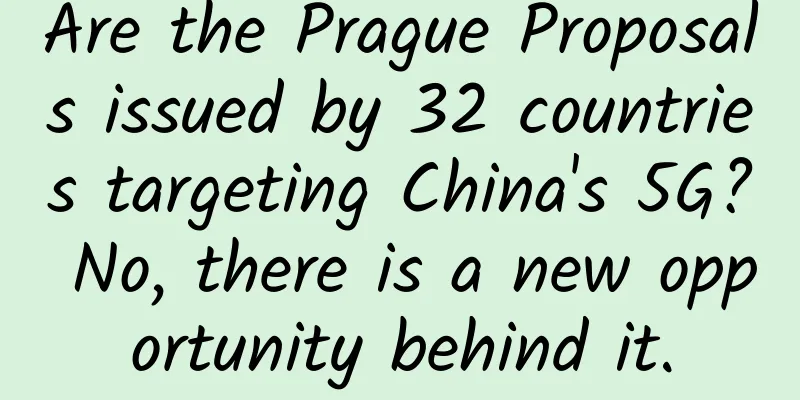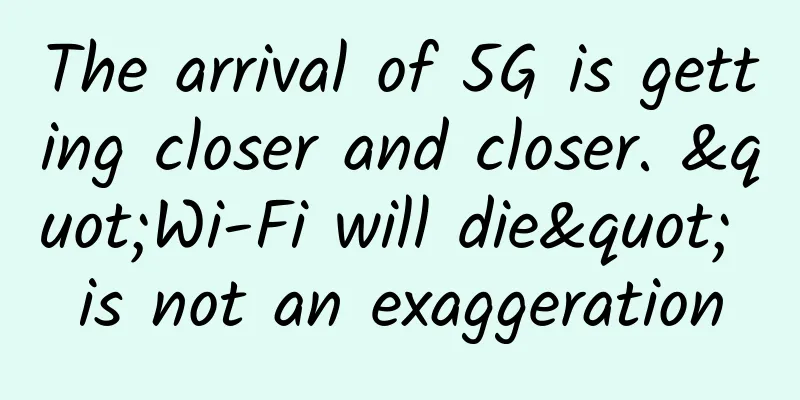Are the Prague Proposals issued by 32 countries targeting China's 5G? No, there is a new opportunity behind it.

|
In Prague Square, white doves are facing the sunset, and the Gothic buildings decorated with stained glass and the 18th-century oil paintings are so beautiful that I dare not look at them. The Prague described in Jay Chou and Jolin Tsai’s lyrics is a peaceful and hopeful place. However, during the May Day Golden Week in China, a conference on 5G security held in Prague was interpreted as a conspiracy and joint strangulation against China and related companies.
From May 2 to 3, representatives from 32 countries around the world, including the European Union, NATO, the United States, Germany, Japan, Australia, and four global mobile network organizations, gathered in Prague, the capital of the Czech Republic, to hold a high-level government official 5G security conference so far. It is worth mentioning that as the main developer and builder of 5G, China and its relevant representatives were not invited to attend the conference. The Prague 5G Security Conference was chaired by Czech Prime Minister Andrej Babis and Foreign Minister Tomas Petreček. The conference elaborated on 5G security from four aspects: policy, security, technology and economy. The key point is the release of the "Prague Proposal", which is a joint statement of non-binding policy recommendations and practices. According to external interpretations, this approach of linking the security of 5G technology with factors such as the country's governance model and legal environment is clearly aimed at Chinese companies. It makes things difficult for Chinese telecommunications companies, making it impossible for them to meet these so-called security standards and thus exclude them. In addition, the White House issued a press secretary statement on the 5G "Prague Proposal", saying that the United States will fully support the Prague Proposal and make it a series of recommendations for countries on 5G construction. The US government will use the Prague Proposal as a guide for action. This has further increased the suspicion of the crowd about the purpose of the conference. Is it a simple joint statement or a joint stranglehold? No longer discussing 5G technology security separately The content discussed at this conference expanded from 5G technology security itself to national strategies, policies, laws and other fields. At the same time, the discussion on preventive measures also permeated into every aspect of 5G construction, with an emphasis on supply chain security. As we all know, it has become a tacit fact that 5G has risen from the field of communication network technology to the national and government levels. Governments of various countries have regarded 5G as an important means to redefine people's communication methods, lifestyles, and production and working methods in the future. In addition, future transportation, energy, agriculture, national security and other aspects will be greatly affected by 5G. 5G's features of connecting everything, large capacity, low latency and high reliability help it become part of the national digitalization strategy.
The immeasurable potential of 5G in the future is destined to make it fundamentally different from every previous generation of communication technology. The conference pointed out that while 5G drives innovation, accelerates change, and stimulates growth, it also brings significant risks to the public interest and poses a huge challenge to national security, economic security, other national interests, and global stability. All parties at the meeting reached a consensus that cybersecurity should include both technical and non-technical issues. A safe, reliable and resilient infrastructure not only needs to consider the nature of the technology itself, but also requires appropriate national strategies, sound policies, a comprehensive legal framework and properly trained and educated personnel to protect civil liberties and privacy through strong cybersecurity support. At the same time, the conference also believes that there is no general solution to cybersecurity, and cybersecurity measures need to be broad enough to cover the overall scope of security risks, namely people, processes, physical infrastructure and tools at the operational and strategic levels. The most important thing is that all stakeholders should shoulder the responsibility of jointly promoting supply chain security. The conference believes that operators of communication infrastructure often rely on technologies from other suppliers. The main security risks come from the cross-border complexity of the increasingly globalized supply chain that provides ICT equipment. These risks should be considered as part of risk assessment based on relevant information, and efforts should be made to prevent the penetration of harmful equipment and the use of malicious code and functions. 5G security issues are the same, the world cannot do without China In fact, the topic of 5G security has always been one of the core issues discussed by various countries. 5G not only carries the responsibility of connecting people, but also bears the important task of connecting things, things and people, and the Internet of Everything. 5G attracts more and more industries to integrate with it. In the tide of digital transformation, the Internet of Things is deployed on a large scale around the world, and network threats are bound to increase accordingly. Zong Shuji once said at the National Conference on Cybersecurity and Informatization, "Without cybersecurity, there will be no national security, no stable economic and social operation, and the interests of the general public will be difficult to protect." The US statement mentioned that since 5G has changed the previous rules to become a new global system, all factors affecting 5G network security mentioned at the Prague conference will become issues that every country must consider.
Whether for China, the United States or the world, 5G security is destined to be a long-term issue of discussion. The key to the problem is not whether the United States and its allies will exclude China. In reality, the possibility of this is almost zero. Recently, German patent database company IPlytics released statistics as of March showing that China accounted for 34% of the number of standard essential patent applications required for 5G communications. In terms of companies, Chinese companies Huawei (15.05%), ZTE (11.7%) and China Academy of Telecommunications Technology ranked 1st, 5th and 9th respectively. Tim Perlman, technical officer of IPlytics, said that even if Huawei does not sell products in the United States, it can still obtain patent royalties. It is not difficult to see that in terms of 5G patents alone, it is bound to be difficult for any country to bypass China and directly participate in 5G construction, including the United States. Moreover, as the host of this conference, Czech President Milos Zeman expressed support for Huawei when he met with Huawei founder and CEO Ren Zhengfei in Beijing at the end of last month, and expressed the hope that Huawei would play a greater role in the digitalization and 5G deployment in the Czech Republic. “American rules” are not international rules Compared with the overly exaggerated interpretation of this meeting by the outside world, I think this is just a necessary process in the development of 5G internationally. It cannot be regarded as strangulation, but can only be interpreted as restriction at most. The "Prague Proposal" released at this meeting is not binding at the level of international rules, and its scope is limited to the United States and its allies. Judging from the development of the matter, although the United States has long wanted to strangle China's 5G, the effect achieved in fact is not as expected.
At present, Huawei alone has shipped more than 70,000 base stations and obtained 40 5G commercial contracts from all over the world, including the United Kingdom, Germany, the Philippines and other countries. This means that 5G security has begun to develop from the technical level to the regulatory level. This is an inevitable trend in the development of things and an important node. Regarding network security in the 5G field, countries around the world are highly unified in the necessity and urgency of establishing an international convention, but the core issue is that the interests of countries are different. The rules formulated in a small scope this time are, to a certain extent, an initiative of the United States to safeguard its own interests, but it is ridiculous to elevate them to international rules. Such a small-scale meeting will inevitably have a greatly reduced binding force. Secondly, in an exclusive agenda, the lack of participation by China, an important 5G builder, means that the scope of the constraints cannot be compared with international standards and norms, and it is difficult to convince the public in terms of scientificity and persuasiveness. The Prague Proposal is an opportunity Although the game between China and the United States does exist, it may not be as severe as the outside world interprets. From a dialectical point of view, opportunities and challenges must coexist, and it is not necessarily a bad thing for the meeting to set rules and regulations. For example, the Prague Conference affirmed that a diverse and vibrant communications equipment market and supply chain are essential for security and economic recovery. According to the requirements of the meeting, it is not difficult to see that the economic proposals emphasize market fairness and transparency. In this way, the review of the technical capabilities, security capabilities and access qualifications of global suppliers will be stricter, but on the other hand, it can reduce the rejection of Chinese companies that meet the supply conditions from participating in the world's 5G construction. As for policies, this conference will certainly prompt us to export China's rules, coordinate China's and foreign positions, and promote the formulation of international laws and rules while striving to meet the interests of all parties. |
<<: 5G is here, will the true Internet of Everything start with the eSIM card?
>>: Who will win the global competition for 5G?
Recommend
127.0.0.1 and localhost, how to choose?
In actual development, we often use 127.0.0.1 and...
CDN shifts from price war to technology war, will video cloud rewrite the market landscape?
Just as the rise of e-commerce was premised on th...
RAKsmart: Bare metal cloud server flash sale from $49/month, 125~253IP bare metal cloud cluster server from $130/month
RAKsmart offers a series of promotional products ...
BudgetVM adds 10-100Gbps bandwidth servers, New Year special offer starting at $99/month
I saw the information about BudgetVM's New Ye...
How to easily cope with the challenge of providing Internet access to dormitories for 20,000 teachers and students? What tricks did Qilu Normal University have?
How to meet the Internet access needs of nearly 2...
Network | Can 5G’s cool applications be realized?
[[322560]] 5G is coming to us rapidly. Once upon ...
WiFi coverage is fully covered and the pain points are solved on the last day of the holiday
It's the last day of the holiday. Did you get...
WiFi 7 is coming, but is it really reliable?
There is no fastest, only faster. WIFI6 has just ...
How much room do operators have for increasing speed and reducing fees?
The "Economic Operation of the Communication...
F5 Powered by NVIDIA BlueField-3 DPU Accelerates AI Application Delivery
F5 recently announced the launch of BIG-IP Next f...
Log Analysis for Software Defined Data Center (SDDC)
Modern infrastructure is generating log data at a...
Can operators make money without doing anything?
[[342624]] This article is reprinted from the WeC...
Why do we need UDP protocol?
Every programmer should know TCP and UDP protocol...
Looking at Huawei in the 5G era, which of the 149 suppliers can achieve success?
The past of Apple’s industrial chain may very wel...
Let’s talk about the complete guide to HTTP status codes. Have you learned it?
1. Overview of HTTP Status Codes 1. Concept When ...









